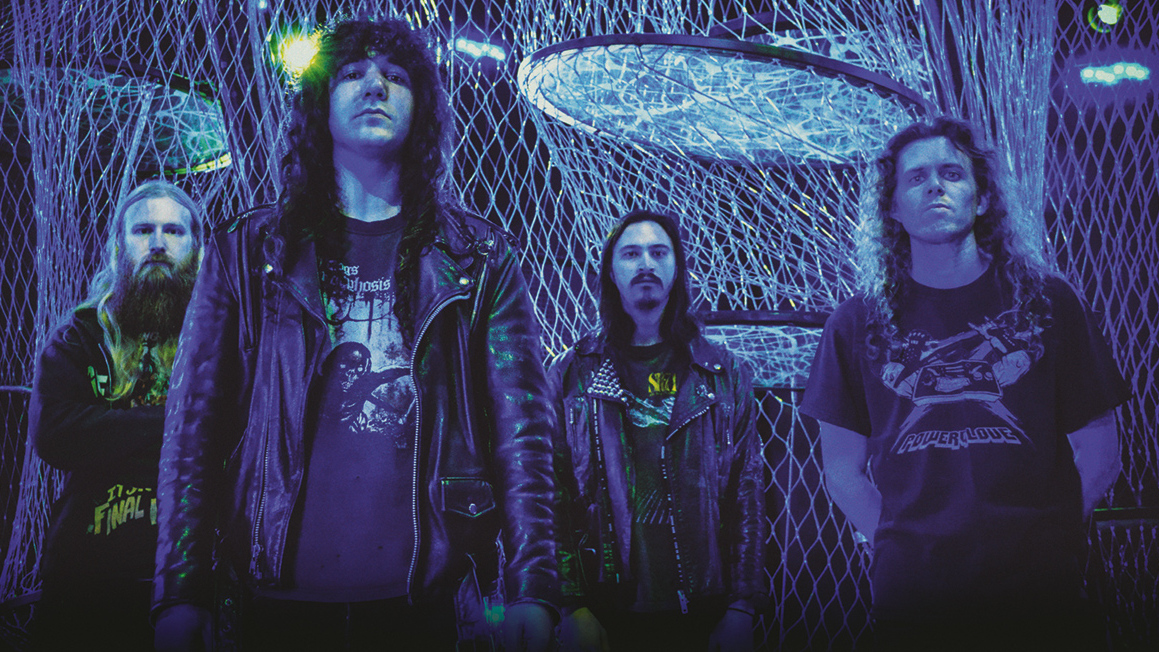Why Vektor are taking trash into the final frontier
"Sci-fi and thrash are our two favourite things!"

Select the newsletters you’d like to receive. Then, add your email to sign up.
You are now subscribed
Your newsletter sign-up was successful
Want to add more newsletters?

Every Friday
Louder
Louder’s weekly newsletter is jam-packed with the team’s personal highlights from the last seven days, including features, breaking news, reviews and tons of juicy exclusives from the world of alternative music.

Every Friday
Classic Rock
The Classic Rock newsletter is an essential read for the discerning rock fan. Every week we bring you the news, reviews and the very best features and interviews from our extensive archive. Written by rock fans for rock fans.

Every Friday
Metal Hammer
For the last four decades Metal Hammer has been the world’s greatest metal magazine. Created by metalheads for metalheads, ‘Hammer takes you behind the scenes, closer to the action, and nearer to the bands that you love the most.

Every Friday
Prog
The Prog newsletter brings you the very best of Prog Magazine and our website, every Friday. We'll deliver you the very latest news from the Prog universe, informative features and archive material from Prog’s impressive vault.
Heavy metal and science fiction go together like Donald Trump and ignorant horseshit. Given how many of us are huge fans of sci-fi comics, movies and literature, it seems inevitable that Vektor will conquer metal. With a sound as vicious and inventive as anything the thrash scene has conjured since its mid-80s heyday, and a thematic devotion to wild and vivid visions of a turbulent, hypertechnological future, the US quartet are ticking some essential boxes with a flourish. For guitarist, frontman and chief songwriter David DiSanto, bringing heavy music and sci-fi together has been a lifelong labour of love.
“Really early in life, my dad used to let me watch a lot of movies that most people wouldn’t let their children watch!” he laughs. “I was maybe four or five years old and I saw La Planète Sauvage, or Fantastic Planet in English, and it was this cool, early 70s animated film. It’s super weird. Then there was The Thing, the original version. Those were probably my two favourites when I was a kid. My dad was into horror and sci-fi movies and stuff, and he passed that on to me from a very young age. He’s also hugely into Zeppelin and Hendrix and he always had guitars lying around the house. I’d pick ’em up from time to time. So I had a cool dad and I still have a cool dad! He’s actually our number one fan and listens to our albums in his truck every day.”
On their first two records, 2009’s Black Future and 2011’s Outer Isolation, Vektor combined the furious, spiky thrash of Destruction with Voivod’s sci-fi themes and structural quirks. For latest album Terminal Redux, the gloves areoff and the safety net has been torched. Anintricate concept piece that brings to life astory that David has been tinkering with for four years or more, it draws on the conceptual opulence of prog bands like Rush and Pink Floyd, boldly going where no thrash metal has gone before.
“This one is pretty deep,” he nods. “It’s areally big idea. There’s been a line from the Rush album, Hemispheres [released in 1978], that’s been echoing in my head for 15 years now… ‘We will call you Cygnus, the god of balance you shall be…’ I was always in love with that concept of bringing balance to nature and everything, so four or five years ago, the gears started turning to write this concept album. I did a lot of research on the myths and legends behind Cygnus, in a historical sense and in an astrological sense, and came up with all these big ideas, like wanting to bring balance to this huge space regime that was already in place – and called Cygnus – and the concept really plays around with the idea of humans being the masters of life and death and what the repercussions and the ethics of that are. Itexplores our role in the universe. Even though the album’s almost 75 minutes long, it was hard for me to jam everything in there.” From its multifarious narrative to its stunning artwork, Terminal Redux may appear to have been designed specifically to delight metal’s nerd contingent, but thanks to the way that Vektor also offer a truly expansive vision of what heavy music can be in 2016, their audience has already begun to stretch beyond the usual underground factions. That said Vektor definitely do attract a lot of nerds.
“We get black metal fans, death metal fans, and we’ve got a lot of prog fans for obvious reasons,” David notes. “At a lot of shows, we’ll get anything from people with studs, vests and bullet belts through to guys with Coke-bottle glasses wanting to know all the insanely specific details, and suddenly I’llm feel like we’re at a Star Trek convention. But as long as they’re fans, I don’t mind talking to them. Sci-fi and thrash are my two favourite things, too, so I get it!”
The details that David refers to are important here: Terminal Redux has so many lyrical and music layers that the thrash metal tag seems far too small and restrictive. This is an album to dive into and absorb, its bleak futuristic cautionary tale as fully formed and credible as any Hollywood sci-fi blockbuster. In essence, this is thrash metal in synapsefrying 3D; a bona fide musical journey that makes Vektor one of the most genuinelyprogressive metal bands on the planet.
“Some of my favourite albums when I was a teenager were 2112 [released in 1976] and Hemispheres by Rush, and The Decline by NOFX [1999], which is just one 18-minute song,” David recalls. “Then there’s the Subhumans album, From The Cradle To The Grave [1983], which has one super-long and awesome punk song on side two. Having those songs andalbums as some of my favourite music as ateenager, it just made it seem normal to writereally long, complicated songs and this ridiculous, epic stuff. It’s something that’s always been exciting for me, even though it means that making music is extremely time-consuming!”
Sign up below to get the latest from Metal Hammer, plus exclusive special offers, direct to your inbox!
One of science fiction’s neatest tricks is to offer glimpses of possible futures, both positive and horrific. Vektor’s mastery of the form, albeit via the equally nourishing medium of thrash metal, looks certain to make their future another tale worth telling. If the extent of their musical ambitions is matched by their upward trajectory, who knows where they’ll end up? “Like any band, we want to keeping going up and up, but at the same time we want to stay true to what we’re comfortable with,” David concludes. “We’re all pretty down-to-earth people, and it won’t be any time soon that we’ll be striving to be a Number One bullshit radio-hit band. That’s where the money is and it might pay our bills, but I don’t see us going down that route. It’s about keeping true to ourselves and to our sound. We’ll keep pushing forward, and if it grows? That’s great and we’ll take it.”
TERMINAL REDUX IS OUT NOW VIA EARACHE

Dom Lawson began his inauspicious career as a music journalist in 1999. He wrote for Kerrang! for seven years, before moving to Metal Hammer and Prog Magazine in 2007. His primary interests are heavy metal, progressive rock, coffee, snooker and despair. He is politically homeless and has an excellent beard.
